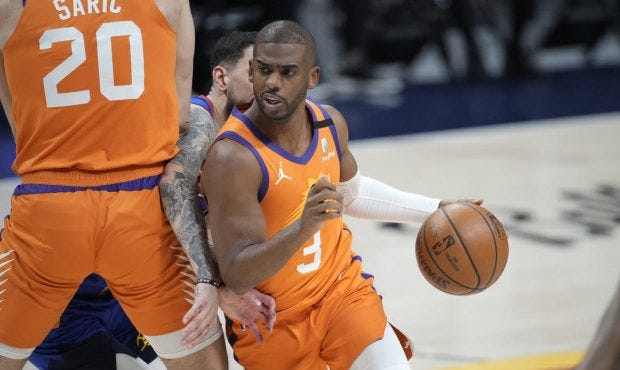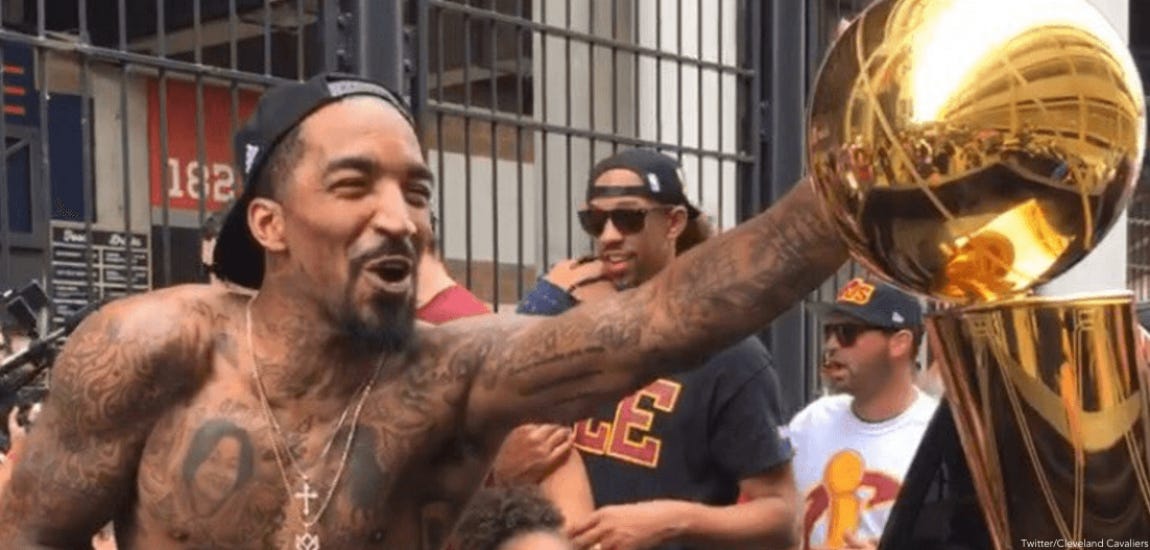The Phoenix Suns are very good right now.
They just completed a handy sweep of the Denver Nuggets in the Western Conference Semifinals, one punctuated by a frustration-fueled ejection of Denver’s newly-minted MVP Nikola Jokic and an impressive bout of pugilistic prognosticating from one of their fans. Young star Devin Booker is on fire, and has been introducing heretofore unseen levels of swagger into the pregame proceedings. With superstars like LeBron James and Steph Curry already at home, and the Brooklyn Nets’ superstar Voltron suddenly reeling from injuries, the Suns—two seasons removed from finishing dead last in the Western Conference—have a very good chance at making their first NBA Finals since 1993 and even winning the franchise’s first-ever championship. At this point, they might even be the favorite to do so.
It is supremely unfair that whether or not they succeed will undoubtedly be a referendum on Chris Paul’s career.
An 11-time All-Star, the 36-year-old Paul’s resume through sixteen seasons in the NBA cements him as a surefire Hall-of-Famer, and that’s not just my opinion: Basketball-Reference’s somewhat convoluted formula for predicting Hall of Fame selections places his probability at 1.000, a level only matched among active players by LeBron James and Kevin Durant. He’s 5th all-time in assists, 5th in steals, and top-10 in several advanced metrics like PER and Win Shares.
He’s very good—great, even!—but he has never played in an NBA Finals, something that a certain kind of screaming fan or pundit will always hold against him, choosing to boil entire careers into screaming about RIIIIIIINGZ. If Paul rides off into the sunset without a giant ring on his finger, his career will be considered a failure by a not-small number of people.
Of course, this problem isn’t confined to the NBA, nor is it a new one.
The quote’s generally attributed to Green Bay Packers coach and Super Bowl trophy namesake Vince Lombardi, but it was first coined by UCLA football coach Red Sanders. You know the one, go ahead and say it:
Winning isn’t everything, it’s the only thing.
There’s plenty of cousins to this sentiment.
Unless you’re the lead dog, the view never changes.
If it doesn't matter who wins or loses, then why do they keep score?
Winning takes care of everything.1
Two is not a winner and three nobody remembers.2
If you ain’t first, you’re last.
Don’t get me wrong. Winning is great. We are coming up on the five-year anniversary this weekend of my single fondest memory in a lifetime of mostly painful sports fandom, the Cleveland Cavaliers’ 2016 NBA championship.
In my own life, I am competitive; I hate losing, whether it’s at basketball or cycling, Scrabble or Connect Four, thumb-wrestling or beer pong.
It is good to be driven to succeed, and when you do, it feels phenomenal.
Viewing it as the only thing that matters destroys everything, though.
Last week, news broke that the College Football Playoff was likely to expand in the future from its current four-team format to a full dozen. From a fan perspective, this is mostly great—it increases access for teams who aren’t Alabama, Clemson or Ohio State, and is likely to create fresher matchups and brand-new rivalries. It’s not great for the athletes who are again being asked to bear more of the weight of a billion-dollar business on their bodies for no compensation. It’s also going to keep fans’ collective focus squarely on a single endpoint to the season, flattening out all the nuance, oddity and joy that happens on the way from August to December in places far away from Tuscaloosa or Columbus.
Chances are, if you tune in this fall to a midseason game between two teams with zero shot at postseason play, at some point the announcers will get bored and start talking about playoff probabilities. I believe this to be true because it already is true; the only thing that seems to matter is who ends up victorious at the very end.
This goes far beyond talk of legacies or mere annoyances, though.
The latest frontier in our never-ending series of culture wars is scaremongering over the presence of trans students in school athletics, a thing that is certainly not a problem in any actual way but has been turned into The Moral Crisis Of Our Times by the kind of people willing to terrorize vulnerable teenagers to gain a handful more votes from bigots. It is unfair, they say, for students assigned male at birth to compete against cisgender girls. They will have an unfair advantage, they scream, going so far as to suggest that cisgender boys might “pretend” to be girls in order to win at sports, something willfully ignorant of the hell trans people are put through by people saying and doing exactly the things that they are saying and doing, an ordeal it’s safe to say no one would willingly undertake were it not for a fundamental truth of their identity.
There was an excellent Twitter thread on the topic several weeks ago—one that of course I failed to bookmark and cannot find now—that pointed out, beyond the obvious and heinous bigotry, the societal rot that underpins and ultimately enables this argument: the sentiment the only point of scholastic athletics is to win.
Sure, there are athletic scholarships at stake for some; Olympic or pro dreams for a select few. But for the vast, vast majority of high school athletes, the point of the game is the game itself, and there will be no Division I scholarship, no opening ceremonies, no NBA or WNBA glory. For almost every student who steps on a field, the takeaway is not going to be winning but rather playing: learning discipline and teamwork, bettering oneself physically and mentally, relishing their youth and having a good time.
Those are opportunities that should be open to everyone, and our collective fixation on the most narrow view of success—the idea that someone might develop an unfair advantage, and thus win—allows ill-intentioned manipulators like the ones currently inhabiting many state legislatures to turn child’s play into a political battleground.
We need to shift our focus.
Now, I could be fairly accused of not caring enough about winning because I’m not much of an athlete myself, or perhaps because I’m a fan of Cleveland sports teams who’s developed it as a survival mechanism over the years.
I don’t think that’s it, though.
I’ve competed in things. Over the last twenty years I’ve done a series of marathons, triathlons and other endurance events—events where merely finishing was the goal, and winning a genuinely preposterous notion. The last time I played any organized team sport, even by the loosest definition, was on a corporate rec-league softball team in my 20s, at my first post-collegiate job. My company’s team was dogshit; we lost twice as much as we won, and our biggest victory most weeks was if we made it to the park with enough players to avoid a forfeit. We made a lot of errors, hit more batters than you really should in slow-pitch softball, and always had a terrific time doing so.
A bit later—through a connection I made playing in those games—I took a job with a larger, more prestigious company that fielded a team in the same league. That team was run with an iron fist by a 30-something middle manager, the kind of man who takes things like rec-league softball far too seriously and—I’m speculating here, but feel comfortable doing so—probably has some thoughts about Chris Paul’s legacy. The team was preoccupied with winning, and despite doing a fair amount of it, wasn’t a lick of fun. They missed the point, because if the only point was being the best architects at softball, that’s an awful sad and small hill to plant your flag on.
I quickly opted out, and haven’t swung a bat outside of a cage since.
Maybe the Suns will continue their hot streak all the way to the NBA title, and render one more discussion of legacy moot; maybe they won’t, and Chris Paul will eventually retire with the same “couldn’t get there” stigma that’s branded onto the legacies of former superstars like Dan Marino, Charles Barkley, Karl Malone or Ken Griffey, Jr.
Maybe we’ll continue to dismiss moments of triumph, artistry and joy that don’t end on a podium as somehow false or fundamentally lacking. Maybe we’ll continue to teach young athletes the wrong lessons about what they’re doing, and punish some needlessly in the process.
I’ve decided to root for the Suns the rest of the way this year; I hope Chris Paul wins a championship, and gets the career validation he already deserves, if only to extinguish one such debate from The Discourse.
I just I wish it didn’t matter quite so much.
—Scott Hines (@actioncookbook)
Part of an old Nike ad campaign featuring Tiger Woods, which: maybe it doesn’t
Nelly’s “Number One” was his higher-charting song about competition, but I think we can agree that “Heart of a Champion” was better.






4th attempt at a comment without getting on a soapbox.
We are not winning because we have already lost. We lost when we stopped "loving the game." We lost when we are just focused on wins and losses who cares about the carnage that preceded or follows. We keep trying to say that we are better and learned from the past, but google "Canton McKinley football" and tell me how that coach learned anything but to continue the cycle.
We have kids as young as 5 in year round athletic events, pigeon holing them on the first sport that they show interest in because we are at the point of seeing dollar signs and scholarship potential and not whether the child cares. We have Netflix shows on these same kids as they get older for our viewing pleasure and judgement.
We have forgotten about fundamentals of sports. We turn on an NBA game and routinely see multiple players score 30 points on one team and say why not 40 but we don't care if there isn't an ounce of defense from the other side. Or what a dribble looks like. We don't care what a good teammate is just whether they are the one who can make our team win.
We are so scared to just love the game and be average that it's killing sports and the love of the game.
Last season I (hilariously) coached my kids U8 hockey team - after not slapping on the skates for a good 3 years I was now skating twice a week at 60 minute practices. His favorite part was the different drills and just hanging out with his teammates (a welcome respite in the times of remote school)
After evaluations at the end of the year he leveled up and I got a call from the new coach asking me if he was playing any summer hockey to keep the competitive juices going. I told him he’s doing lacrosse this spring, which seemed to be an acceptable answer but what I wanted to say is “THE KIDS ON THIS TEAM ARE 6/7/8 YEARS OLD FOR FUCKS SAKE”
I really hope my intuition is wrong about this guy.